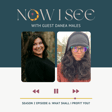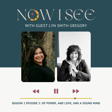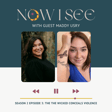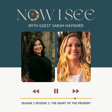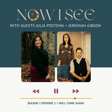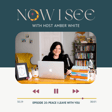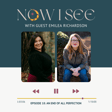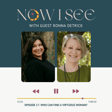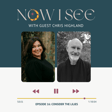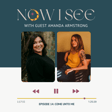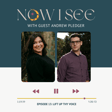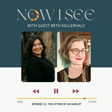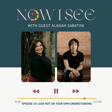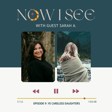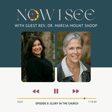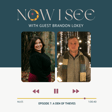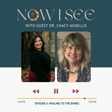Become a Creator today!Start creating today - Share your story with the world!
Start for free
00:00:00
00:00:01

Fearfully and Wonderfully Made: Radical Self Acceptance After Gay Conversion Rehab with Seth Showalter
Radical self acceptance is hard. It can be even harder when you’ve been raised under the umbrella of high-control religion that wants to suppress, hide, and “convert” your sexuality to conform to their ideals.
In this episode, Seth Showalter shares his remarkable story of learning to love himself after years of hiding his sexuality and even attending a gay conversion rehab. Seth’s story is a powerful one you don’t want to miss.
Resources from Seth
- Read Seth’s Book Finally Free: A Surrender to Authenticity
- Visit Seth’s Website
- Follow Seth on Instagram
Links
Transcript
Introduction to 'Now I See' Podcast
00:00:01
Speaker
I was lost in utter darkness I was trapped in toxic shame I was bound by my religion Till I chose to break away
00:00:24
Speaker
Now I'm finding my true colors For the first time I feel free Now I'm learning self compassion And as I heal I'm finding peace
00:00:51
Speaker
Welcome to Now I See, eye-opening stories from the formerly faithful. I'm your host, Amber White, and here, me and my guests share our experiences in loving and leaving rigid faith systems.
Guest Introduction: Seth Showalter
00:01:06
Speaker
Together, we shine a light on the dark corners of these institutions and share the joys of rebuilding life on our own terms. I promise you'll leave inspired, even if you are a little teary-eyed.
00:01:24
Speaker
Hi, and welcome back to Now I See. I'm your host, Amber White, and today's episode is one that has me all up in my feelings. I'm talking with clinical supervisor, therapist, and now author, Seth Showalter.
00:01:41
Speaker
His new book just hit the shelves this month.
Exploring Radical Self-Acceptance
00:01:44
Speaker
It's called Finally Free, A Surrender to Authenticity, and I have been hooked on it since I first started reading the advanced copy Seth shared with me. I don't want to tell his story for him, but I do want to touch on a major theme that has been sitting heavily with me over the past few years, and even more since Seth and I recorded.
00:02:07
Speaker
radical self-acceptance. It is unfortunately very common for folks who leave high-control religious groups and families to struggle with self-acceptance. The messaging we receive is that we need to die to our wants, needs, thoughts, and feelings until they look nothing like us and only reflect Christ. Putting aside the fact that the reflection of Christ these groups are referring to
00:02:37
Speaker
looks a lot like their own ideals and rarely questions them. This is a dangerous form of brainwashing that separates us from our own minds, intuitions, and ability to mature and develop emotionally at appropriate life stages.
00:02:54
Speaker
I remember hearing many times in church that dead men don't react. The idea being that if you were truly dead to self, you wouldn't ever feel or respond in a way the church deemed sinful. I'm here to tell you that what this actually leads to is being dead inside.
00:03:15
Speaker
It is normal and healthy to experience anger, frustration, disappointment, and sadness. These are all part of the human experience, and it is definitely okay to be upset with somebody who hurts you.
00:03:32
Speaker
I wish I could go back and redo the years I spent letting people walk all over me because I believed that's what made me a good daughter, a good friend, or a good partner who was doing their best to be loving and kind. It's just not true. And if anything, that belief kept me from figuring out who I am, what I want, and how to be honest with others about both.
00:04:00
Speaker
It is really hard to live a lie. It's even harder when you don't quite know what the truth is.
00:04:09
Speaker
The journey to radical self-acceptance takes time and it's ongoing. And that might sound hard, but I can assure you it's not as hard as feeling like your own worst enemy. I'm on this journey now, so I'm no expert, but what I have learned is that it starts with listening to yourself and accepting what you hear.
00:04:32
Speaker
I've been doing this a lot for the past few years and it's led to some pretty incredible life changes.
Trigger Warning: Seth's Story Themes
00:04:40
Speaker
I live in a different city, I have a different job, I'm divorced, and I have a podcast that pissed off my entire family and put us on no contact terms. But I've never been happier or more at peace with myself.
00:04:55
Speaker
I have true, deep joy in my everyday life that I just know is coming from being okay with who I am, what I think, and what I want. As you'll hear in this episode, Seth is finding the same thing. It is killing me not to give away his story because it is so powerful and triumphant.
00:05:20
Speaker
I will warn you that this episode deals with sexuality, queer identity, and gay conversion therapy, so it may be triggering to some. But that being said, this story ends well, and love wins.
00:05:35
Speaker
You can find the links to Seth's book, website, and social media platforms in the show notes. If you are particularly touched by this episode, I hope you'll reach out with how it moved you.
Seth's Background and Church Life
00:05:48
Speaker
You can go to this podcast website and use the contact form or email me directly at nowicpodcastatgmail.com. I love hearing from you all so much and I know Seth would appreciate it too.
00:06:04
Speaker
Okay, I won't keep you from Seth any longer. Let's get into the episode.
00:06:22
Speaker
Hi, Seth. I am so excited to have you on the show today. I had such a wonderful time as much as can be had reading a book about trauma, right? Like reading your book and experiencing it. So I'm just super excited to have you here for this conversation. Thank you. Well, thank you so much for having me. I really, really appreciate it.
00:06:44
Speaker
For the sake of our listeners, can you set the scene a little bit and tell me how you grew up, what religion you were affiliated with, and what your attachment to that was?
00:06:57
Speaker
Yeah, so I was born and raised in a Southern Baptist Christian family, and church was everything to my family and essentially to my life. And not only was it important to my immediate family, it was also important to my extended family.
00:07:20
Speaker
so much so that I attended church three times a week, would often go just to escape the trials of things that were happening in my everyday life. So church became a safe haven to me. It was a source of support, comfort, and essentially feeling better.
00:07:45
Speaker
and it was everything. I believed that I was a Christian, God loved me, and that that's what I needed. Christianity was it. Yeah, I really enjoyed that portion of your book where you're talking about how church was a refuge for you. If you don't mind, I'd like to actually read that snippet. Yeah, go for it.
00:08:08
Speaker
Okay. You said, due to never having fit in at my school, my time at church became a haven, even at an early age. I was frequently at church two to three times a week. For example, my Aunt Kelly, who is very instrumental in various children's ministries in our church,
00:08:26
Speaker
was a positive influence in my life. She encouraged me by involving me in a place she directed and would even cast me in lead roles. This was a stark contrast to the rejection I experienced at school. I would also sing solos at church and can remember singing No Turning Back on stage with my dad in front of the congregation.
00:08:46
Speaker
There's actually a video of that. Oh my goodness. Yeah. There's an actual video of me singing No Turning Back with my dad when I was little. Wow. Reading that hymn line there, I was like, oh, I remember that one. That was great. Such a classic. That's good. It was huge. I mean, No Turning Back was a huge deal growing up. That was a huge song.
00:09:08
Speaker
It was, it really fit in with the Christian army mentality that I remember hearing a lot about around the same time. Just the idea that all in, we're not going back, we're not looking back, we're not going to be pillars of salt like Lot's wife, we're keeping our eyes forward.
00:09:25
Speaker
it was really of its time. But I was struck by this quote because I think a lot of people hear stories like ours and they're like, well, why did you subject yourself to it? Or why did there's a million reasons for that family pressure, not knowing any better, not being exposed to the world. But in this case, like,
00:09:48
Speaker
your place in the world was threatened by everything outside of the church. Like you were being picked on and you didn't feel like you belonged and like you fit in here and who doesn't want that?
00:10:00
Speaker
And not only did I fit in there, my family practically ran my church.
Belonging and Ministry Calling
00:10:07
Speaker
So like I said, my immediate family was very devout, but so was my extended family and my entire extended family for the most part. There was a few that weren't living in the area at the time, but
00:10:23
Speaker
The vast majority of my extended family all lived in the same area, and we all went to the same church. So it was not just a random church, but it was a small church, and the vast majority of people who attended was my family.
00:10:42
Speaker
So it became a very big source of support for me, not only in escaping from the rejection that I received in school, but also in receiving support, love, and compassion. And I felt accepted there. Yeah.
00:11:01
Speaker
That's something I was thinking of when I read that quote is so much of your book is about self-acceptance. I'd say that's really the crux of what you learn through your experiences, right, is the self-acceptance. And it really struck me when I read this that the church was how you had acceptance.
00:11:18
Speaker
It's the only way that I felt like I had acceptance. Because I didn't feel like I had acceptance growing up in where I, where I grew up. I grew up in a really small town in Northwest Missouri. I don't mind sharing that. And very small town. And when I say small town, I mean 32 kids in my graduating class.
00:11:38
Speaker
All right. And we were the biggest town in the Tri-County area. So we were a metropolis in comparison to the other towns. Like, for example, my cousins went to a town 30 minutes south of me, like when they lived in a town 30 minutes south of me and went to school there. They had nine kids in their class. Wow.
00:11:58
Speaker
So when I say small, I mean small. We were big in comparison. And so in my school, it really came down to athletics being the number one thing for acceptance. And
00:12:13
Speaker
not to get too much off topic, but I actually suffered a traumatic brain injury when I was a young child at age six. So athletics became a really big obstacle for me, in which case I couldn't engage in those activities and couldn't engage in those sports. So the very place that I would need to go in order to receive acceptance and in order to receive love from my peers where I grew up,
00:12:43
Speaker
I couldn't receive. So the only place that I could find that acceptance and love was the church. That's so interesting. And it's neat how I don't want to give too much away before we get there, but that turned too. Yes, it did. And I think reading through your book and learning about your story, it's interesting how the trajectory of your life was always leading you towards self-acceptance.
00:13:08
Speaker
because anytime you tried to seek it out somewhere else, it just wasn't long lasting. It wasn't there. And I kind of love that for you, but it also comes with its struggles, but I just thought that was a really interesting through line of your story. So continuing on with kind of your story, you were really committed to getting into the ministry yourself without being your life's work.
00:13:36
Speaker
Absolutely. So when you think about it,
00:13:40
Speaker
I, since I didn't feel like I was accepted where I was going to school and I didn't feel like I had very many friends where I went to school, the church was a safe haven for me so much so that I could go there and feel like I was a part of the end crowd. And I can remember feeling called into the ministry at a very young age. In fact,
00:14:08
Speaker
I had a high school mentor all throughout growing up. Well, I shouldn't say high school mentor. He was my mentor growing up. So it was just not high school, but it was, you know, like middle school into high school. And he was a really big support to me, but he was really, really fundamental in his belief system. So fundamental in his belief system that he believed that in order to be called into the ministry, you needed a life verse.
00:14:37
Speaker
a verse that actually called you into the ministry. And I can't remember exactly what the verse was all these years later, but I had one. I had a verse, I had everything. I had the whole nine yards. It was like, nope, this verse, this is it. This has called me into the ministry. This is what I need to do. And so,
00:14:58
Speaker
When I was in high school, I was super engaged in participatory and church events. I helped to run the youth ministry. I also helped to run the sound system every Sunday, and it became just a part of who I was. And so when I actually graduated from high school, I actually did a year internship at Omega Church because I felt called into the ministry. Interesting.
00:15:28
Speaker
And that was my first realm, like my first big step into the ministry was actually working at a megachurch. And then later on, Campus Crusades for Christ, right? Oh, Campus Crusades. I don't even know if they're called that anymore. I don't either. I don't either, but I remember them very well. Oh, yeah. Yeah. 100%. They're everywhere. I think they're everywhere, but I do think they're called something different nowadays. Oh, I'll have to look that up. I'm not sure.
00:15:59
Speaker
I haven't stayed in the loop very well, to be honest with you. I just, I don't care. I understand. I like being on the outskirts. It feels like I found my way. I understand. I get it. But you were really in it. You were striving for this while at the same time struggling with your sexual identity, which was in stark conflict to this career path and this passion and
00:16:30
Speaker
Well, and I think that's partially why the ministry became such a convincing argument and calling for me.
Reconciling Faith and Sexual Identity
00:16:44
Speaker
I feel like it's bold to say that I went into the ministry as a way to earn God's favor, but really at my heart's desire, that's what I was doing. The idea was that if I could go into the ministry, maybe I would earn God's favor so much so that he would actually make me straight or make me okay in his presence.
00:17:08
Speaker
Because once I realized that I was gay and once I realized that I had these desires, it honestly felt like I was trying to fit a round peg in a square hole. It just wouldn't work. And no matter how hard I tried, you couldn't make it work. I talked to pastor after pastor after pastor, mentor, counselors, which by the way, I did see a few counselors that tried to make me straight.
00:17:37
Speaker
Um, I can only imagine Christian kick therapists are kind of a joke, but which by the way, I talk about in my book, but it just was a very, uh, in depth process and something that really, uh, pulled at my heartstrings.
00:17:57
Speaker
You even went through a rehab that had a gay conversion component to it, which is where this book kind of begins in some ways.
00:18:12
Speaker
Correct. So the book that I am coming out with, or it's now available, came out on October 17th, 2023. It's entitled Finally Free, A Surrender to Authenticity. And this book is my story through gay conversion therapy.
00:18:32
Speaker
So I'm kind of fast forwarding to that just so you kind of understand why I'm talking on this podcast and why I'm here is because I have published a book about my story through conversion therapy. And I
00:18:49
Speaker
want people to understand the damage of this type of therapy and the damage that this does to individuals and the impact that this has. I also feel compelled to write such a book because I want Christians to understand the impact of what their rhetoric does to this community. Because I don't think that many Christians understand
00:19:17
Speaker
what their words and what their beliefs are actually doing on the ground level. It's easy to say, Oh, I just believe this, and it's no big deal. But when you actually apply that to people's lives, and then perpetuate that on them, it's an entirely different story.
00:19:35
Speaker
And that's really what my book is all about because it provides you an inside look, an inside glance into the psyche of someone who's trying to actively change their sexuality and what that does to a person. Yeah. It's lifelong damage. Yes.
00:19:54
Speaker
So many of the teachings that you and I grew up with cause damage that I've been working on for 13 years, longer than 13 years, and we'll be working on for 13 more, and you as well. And I don't think they understand the impact, and so I really love that that's such a big part of your mission with the book.
00:20:13
Speaker
I also really love that you talk about how you want people to see some of the mundaneness of the experience because it may not feel that dramatic when those things are happening to you and when you're in it.
Family Dynamics and Expectations
00:20:27
Speaker
And as a person who has a flare for the dramatic, I really appreciated that because sometimes big things are happening in my life, but they don't feel like it. And so you don't see them for the impact that they're having or how big they are. So I loved that you brought that in
00:20:42
Speaker
to the story and you made sure that people got a taste of this is how boring it can look sometimes when something absolutely wild is happening to you. I appreciate that. I even included in the preface. You did. It was great. It's the best introduction. I loved it. I hope when people read it,
00:21:02
Speaker
they should know not to skip the introduction. The introduction sets up the entire thing so beautifully, and it holds a universe that you really need, I think, to get the most out of the book. So I hope people read it.
00:21:19
Speaker
Yeah, without the introduction, you don't know the backstory. The introduction provides the backstory to who I am as a person and why I decided to pursue conversion therapy. Without that introduction, you will not understand the steps that took place that led me down this path because I lay it all out. It's all out in black and white. Like there's nothing that I hold back on this.
00:21:49
Speaker
No, and you do it so succinctly, which I think gives it an even stronger impact. I really just, I appreciated so much about it. I'm about that.
00:21:59
Speaker
Something that struck me in reading your introduction in several of your interviews, and then my next favorite part, which is your epilogue, was the family relationships portion of your story. Because I think that is something that many people who leave their faith as they know it, whether that's to discover a new version of it or leave it all together, whatever that looks like, that's still a struggle.
00:22:23
Speaker
those family relationships because the religion is so intertwined in the family relationships and how the family is structured and how the family functions or dysfunctions as it were. So when somebody veers off the path, right?
00:22:39
Speaker
It just undoes the whole thing. And it's complicated and it's painful. And I really, in particular, resonated with you being so nervous to disappoint your parents and having the feeling of like, I'm the one keeping everybody happy.
00:23:03
Speaker
And I don't want to be the reason that people aren't happy anymore. That was definitely my role in my family. How can I keep everybody happy? And it's always to sacrifice yourself a little bit, right? Or a lot. And I just, I really resonated with that. And I wondered if you could talk a little bit more about that and, and kind of that feeling at that time in your life.
00:23:24
Speaker
Well, having felt called into the ministry at a young age, I felt like it was my responsibility to uphold Christian values in our family. And what I mean by that is I wanted to do things right. I had an innate sense within me to do things correctly. I was the type of kid that didn't drink, smoke, or have premarital sex in high school. I was the goody two-shoe kind of kid.
00:23:54
Speaker
because I believed in those types of things. And I was raised to believe that type of way. And I wanted to hold true to those values and hold true to that line of thinking. And so my brother was not that way.
00:24:13
Speaker
A lot of my cousins were not that way, but I was. And I think that part of the reason that I was so compelled at a young age to uphold my parents' values and really try to make everyone happy and everyone okay was because of my car wreck when I was six years old.
00:24:33
Speaker
which is kind of complicated to get into, but like that car accident made me really vulnerable and it made me really tender hearted. And so I was the type of kids that would cry at a hat. You know what I mean? Like, in fact, I still do. Let's just be real. I cry pretty easily and pretty quickly. I'm very, very sensitive and I always was growing up.
00:24:59
Speaker
And so there was something within me that I just felt like other people's happiness was kind of predicated on me. I felt like if people were upset, then that was my fault. And I don't know why. I don't know exactly where that came from, but I think it has something to do with the car accident. I think that it shifted my brain in such a way that I just became ultra sensitive and ultra
00:25:34
Speaker
compassionate in a way. Does that make sense? Yeah, absolutely. I think there's this probably an element of you feeling like a burden, right? And then all this extra care and needing all this extra attention, extra financial stress on the family. And I'm sure the last thing you wanted to be was more of a burden. And so how can you compensate for that?
00:25:59
Speaker
Right. And it's interesting you brought that up because feeling like a burden is something that was definitely something that was a theme in my childhood because my brother is seven years older than me. And because of my car accident, a lot of things were just given to me and I was kind of watched over.
00:26:24
Speaker
very carefully because of my car accident. I was in a coma for six days and so I had a lot of serious trauma that needed protection. And so my parents really did everything and anything to keep me safe where they didn't do that for Brent, my brother. And so I did feel like a burden because I didn't want to let anyone down.
00:26:55
Speaker
You also have that youngest child situation. So some of it's just what happens. I was the oldest, so that's probably why I'm picking up on that too. But it is just such a different dynamic between the oldest and the youngest, especially with that much of an age gap. My sister is seven years younger than me, and we had totally different parents.
00:27:17
Speaker
we didn't have the same parents. They were in a different place in their life. They had more experience under their belt. They were just different. And there's, there's definitely something to be said for that doubling down at that point with you and how that must've felt. And I, I understand why that would be the outcome is you wanting to make everybody happy and keep the peace and yeah. And keeping on with the story of your brother. I thought this was really fascinating. Your brother came out to your parents first. Yes.
00:27:47
Speaker
Yeah, what was that experience like? Well, OK, we need to clarify a little bit because I kind of forced him out. Maybe a little. I mean, kind of. I mean, maybe not. But yes, it's so encouraged him. I kind of just nudged him like I just kind of pushed him out just a little bit. So
00:28:13
Speaker
I found out that my brother was gay on my way to a camp, a Christian camp. I think I was a junior or senior in high school, and I was working the summer at a Christian camp for boys. In fact, it's the number one Christian camp for boys. I think it's called the Ridgecrest camp for boys. Anyways, who cares? Like really, who cares? But anyways. Sometimes like me like to go look that stuff up and go down a rabbit trail because it's wild.
00:28:43
Speaker
It's called Ridgecrest. But on my way to Ridgecrest in North Carolina, I stopped to see my brother. And as any good brother would do, I did some snooping. And in that snooping, I figured out that my brother was gay.
00:29:01
Speaker
I think you can put those pieces together, yes? Yes. Okay. So at that point, it became very apparent that I was holding a secret and I had to keep this secret.
00:29:17
Speaker
And so I kept pushing Brent like, Hey, you need to tell mom and dad because I don't want to have to keep the secret because I tell mom and dad everything like mom and dad know everything about me because I'm the youngest child and I have a brain injury. So like, there is no secrets. And so later on that summer, we went on a vacation to the lake. And I essentially just turned to my brother and was like,
00:29:47
Speaker
Hey, Brent, is there anything you want to share with mom and dad? You know, kind of gave him the wink and, uh, you know, just kind of politely nudged him, nudged him out. And, uh, he then came out to mom and dad at that point.
00:30:05
Speaker
And in the moment, if I'm remembering correctly, they were surprisingly kind of loving. Yes. And were always going to love you. But then the aftermath and what you saw when he was gone and you were at home was a little different. Very much so. Yeah.
00:30:26
Speaker
Yeah. What they portray and what they deal with are two different things. And like, I want to give my parents some credit here because I think that they're doing this out of love and compassion because I think at the very heart and root of all of this is my parents deeply, deeply care and love my brother and I. Of course. I don't think that they had any
00:30:49
Speaker
hurtful or ill-natured intent within them to hurt us or to reject us or to push us out, they very much wanted to accept who we are as people. However, it flew in the very face of their religious belief. And so while they, on the outside, put forward a front of, hey, we accept you, we love you, we care about you,
00:31:20
Speaker
What was happening behind closed doors when Brent was gone was a different story. And I got to see that firsthand being the youngest child. I would often catch my mom crying in different rooms of the house. I often found that my dad really isolated himself.
00:31:41
Speaker
and didn't want to talk to very many people. He was really concerned that, you know, if people in the community found out that my brother was gay, that that could hurt his business as a salesperson. Wow. You know, like there was small, small town America. There's a real impact on some of these things. And so they were very concerned about some of those impacts and potential effects. And they really struggled with it.
00:32:11
Speaker
Yeah, there's a quote in particular I'm going to pull now because I just... Yeah, go for it. This one had me thinking for a good while after I read it and it said, looking back, it was likely my mother wondered what she had done wrong, how she had failed my brother as a parent.
00:32:30
Speaker
She once said that after all the trouble my brother and I had experienced in high school, she had expected daughters-in-law and grandchildren as a reward. All her friends were enjoying their growing families, and she ended up with a gay son. I once heard her tell my brother that if she were in my brother's shoes, she would have never burdened her parents with this information. After hearing her say this, I knew I could never disclose my own sexual struggles until I was straight.
00:32:58
Speaker
Welcome to my journey. Yeah, it was such a moment in your journey too, because with your brother coming out, it could have felt like an opportunity for you to be in it together. Yeah, that's not how that works. But it was a doubling down, which is exactly what I would have done, double down and like, nope, not gonna face that.
00:33:20
Speaker
And I get it. Like nobody wants to be a disappointment to their
College Years and Coping Mechanisms
00:33:24
Speaker
parents. It's brutally painful. It is terrifying and it is sad. And like for people pleasers, my hand, both hands are raised. It's especially scary. Yeah.
00:33:37
Speaker
And I am still unwinding that childhood, like that child self-scared part for my adult self and trying to find that balance and it's really difficult. And reading that, it was such a great encapsulation of that feeling of how much you don't want to disappoint these people that you love and that you know love you.
00:34:00
Speaker
But you're just at odds on this belief that is so deeply entrenched in the family and in each person in the family And it's just ripping it all apart from the inside out. Yeah, literally Literally, yeah, and so you you did double down at this point Yes, I did and I kept everything a secret. In fact, I didn't tell anyone I
00:34:25
Speaker
Anyone. You went through college, right? And doing campus crusades for Christ and trying to date women and finding great friendships in that experience. Oh yeah, it got super interesting. Yeah, I bet. Made it really easy to follow purity rules, I bet. Oh yeah, super easy. Super simple.
00:34:48
Speaker
Tell us a little bit about that stretch of time from college and what you were experiencing in this doubling down phase until you decided to go to this rehab. I want to be clear. When I was in college,
00:35:04
Speaker
Okay, I'm going to back up a little bit, and I'm going to share a little bit of some stories here because when I first graduated from high school, I actually went to school at a community college first because they offered an internship through a megachurch because I felt called into the ministry.
00:35:26
Speaker
So as any good Christian would do who's doubling down in order to prove his favor with God, he's going to do anything and everything he can to earn God's favor. So what is he going to do? He's going to dedicate himself to a youth ministry.
00:35:41
Speaker
with a megachurch. Why not? So that's what I did. Little did I know the worship pastor was also secretly gay and that became a thing. Well, when I say worship pastor, I don't mean worship pastor. I mean the worship leader of the youth ministry. So the youth ministry worship leader, he was also secretly gay. And so
00:36:03
Speaker
As part of the youth ministry team, we used to go out and drink frequently on Friday nights with the church that I was interning at. They had Friday night church, which was called for the true Christians, for the diehard Christians who go to church on Friday nights. The ones who are truly dedicated, yeah. The hard to diehards.
00:36:26
Speaker
So we would go to church on Friday nights, and then after Friday nights, we would always go out and drink at the worship leader's house. And when you add alcohol into the mix, things started to get a little loose. And I pretty much figured out pretty quickly that this worship leader was also gay. And so him and I ended up having some intimacy, and that caused a lot of turmoil and a lot of stress.
00:36:55
Speaker
And then after that, I went ahead and went on to a major university to finish out my undergrad degree. And during that undergrad degree, that is when I got involved with Campus Crusade for Christ. It's when I got involved with the mega church here in that town. And I also got involved with Christians who were involved in all these ministries. As part of my efforts in doubling down, I did date some women, but
00:37:21
Speaker
That only lasted a little bit because it was a large university. And so, you know, there was quite a few gay people around and that was a pretty big temptation. Having grown up in a very small town in Northwest Missouri, it was like, oh, there's other people here that I could like have some fun with. And so I started doing those activities and so in engaging with some of those people.
Coming Out and Conversion Therapy
00:37:45
Speaker
And as I started to do that, Campus Crusade figured it out.
00:37:49
Speaker
And so then all of the stuff started to happen. They started to enforce discipleship classes. They started to enforce mentorship. They started to enforce guidance from someone who used to be gay but was healed and by God and was now married to a female. I was pushed into
00:38:11
Speaker
special Bible studies. I had to go to special conferences specifically on homosexual change and that offering hope that you could actually change your sexuality. And I essentially went through this process throughout my entire undergrad experience. And it was this back and forth, back and forth, back and forth.
00:38:32
Speaker
And to be just completely honest with it, I would go, I'd hook up, I'd do the sin, and then I would repent. Do the sin, repent. Do the sin, repent. Just this constant back and forth, back and forth, back and forth, where I constantly felt guilty and I constantly felt like I wasn't good enough. In the process of doing this, I started abusing drugs and alcohol because it was the only way that I felt like I could numb the pain and survive.
00:39:01
Speaker
Yeah, and it was not healthy. It was not good for me and it was not helpful So when I graduated from college, I essentially went to my parents and I said, you know what? I think uh, I think i'm gay And uh, I also think i'm abusing substances and I need help. That's a big move Yeah I essentially told my parents throw me in a room lock the door and throw away the key until I can come out straight
00:39:31
Speaker
Did that answer that question? Yes, it did. All right. So not only are you coming out to your parents at this time, which is something that you've been doubling down trying not to do. Now there's the drug and alcohol component, but you're coming to them with a solution. So you're still doing the, I can fix this. I can make everybody happy. I can be the person. You're still in it, but now you're getting, I'm going to say this in quotes, help, which maybe for the drugs and alcohol, but not what you can do about being gay. It turns out.
00:40:00
Speaker
Yeah, that unfortunately I didn't have much of a choice in changing, but I thought I could because I thought it was offered to me that God had the power to change that.
00:40:11
Speaker
Yeah, and this is where I'd like to point out, I feel like I hear so many people that are still in the church saying they were never truly committed. When the truth is that many of those same people would never be that committed, would never put themselves that far into it, would never really risk it to keep doing it. And you did, I think it's hard to imagine somebody more in it than that.
00:40:35
Speaker
then saying, send me to therapy, get me the help, just opening themselves up in this raw and vulnerable way and saying, I'll do it, I'll do whatever it takes. Yeah, because I didn't want to go to hell. And you didn't want to disappoint God, right? And it mattered to you, you were committed. And I think that's a really important thing to note for the folks out there who I hear sometimes saying things like, well, he was just never really, that couldn't be further from the truth.
00:41:06
Speaker
Yeah. And my book proves that that is like, if you read my book and you walk away thinking that is what happened, please email me, please call me, talk to me because I actually want to know. Let's talk about it because I really want to know how you came to that conclusion because I did anything and everything I could to try to change my sexuality and was unsuccessful. And that's what really bothers me so much about the political divide right now. Ooh.
00:41:36
Speaker
Yeah, I know. But like, especially like on TikTok, like on all these lives, like that they go in and they talk about this stuff and people are like, yeah, homosexuality is a choice. And I'm like, excuse me. I actually, I tried to change. I did all of this stuff. Are you telling me that like I failed? Like that there's something wrong with me that I haven't done enough stuff? Please tell me what else was I supposed to have done?
00:42:06
Speaker
But the truth is they would rather keep berating you and bringing you down and saying all of those things than to look even for a second inward and say maybe I'm wrong. And that's where I love where your book takes this is you just learning that self-acceptance because that is your weapon against all of that willful ignorance.
00:42:26
Speaker
all of that misinformation. Sometimes it's not willful. There are people that are still on their journey of getting out of the willful stage, but it's still ignorance. But nothing can take your self-acceptance from you. External acceptance can be taken away very quickly, but self-acceptance
00:42:45
Speaker
that is a phenomenal armor. And it's interesting because it does require so much vulnerability, which often doesn't feel armored up. But self-acceptance is a phenomenal way to protect yourself from misinformation and hatefulness. And I love that you come to that. I think it's so important.
00:43:04
Speaker
It takes a long time, everyone. So if you pick up my book, just know you've got a long time before you get to the acceptance phase. It's sprinkled, but it's sprinkled throughout. It's going to take you a hot minute before you get to the meat of that self-acceptance. Anyways, just throwing that out there.
00:43:26
Speaker
It's true, and I like to remind people often on this show that it took me 13 years to get to making this show. I left fundamentalism 13 years ago. That's a long time to just now start being able to say out loud and publicly, I kind of fucking hated it.
00:43:43
Speaker
Like, this isn't right. Like, I don't think this is a good thing for people and here's why. And it's a big moment and it's okay for it to take time. And the journey is kind of amazing now that I've accepted that it's a journey. And I'm glad that you make that clear and that that's part of your book is sharing this piece of this long journey to self-acceptance. So tell us a little bit about how the book is structured because it's kind of unique and really cool.
00:44:13
Speaker
Yeah. So it's structured in a way that's unlike most books. So the introduction is essentially my life story from the time I was born until the time I decided to go to conversion therapy.
Post-Treatment Realizations
00:44:29
Speaker
So like the introduction covers 22 years of my life. Then we move into day one,
00:44:36
Speaker
through day 89 of my experience in this program. And each day is structured in a really unique way. There's actual excerpts from the journal itself that I wrote when I was in this program with reflections after each excerpt
00:44:57
Speaker
of what I think now in present day of what I think looking back as a licensed clinical social worker and therapist. I love that. Yeah. And by the way, the journal itself was 300 pages long. Oh my goodness. So you've had your work cut out for you going back through this.
00:45:17
Speaker
It's, yeah, it took a long time for this to finally get published. This has been a long work to get done. It was not done overnight. Let's just put it that way. But what's cool is that you get to see what my mindset was when I was in the program and then immediately
00:45:39
Speaker
you get to see what my mindset is now, back and forth, back and forth, back and forth throughout all 89 days, which is a really cool and unique way of reading a book. And then the epilogue essentially covers my life after that treatment program until now. And spoiler alert, I call out a few things in the epilogue, like the church. So I don't hold back. I don't hold back.
00:46:09
Speaker
I loved it. I really enjoyed reading it. Um, for those of you out there, you should be jealous. I got an advanced copy of this and this episode. And so I'm just super stoked for it to come out so you can see how neat it is. It really is cool to see you going back and forth.
00:46:24
Speaker
Because it's all you, right? It's these versions of you separated by time and the newer one getting to reflect on the older version. It's so neat and that's something I only do in my head, right? Is reflect back on my older selves. But you've gotten to put it onto paper in a really incredible way. And I just think it's neat to get to see where you were at when you went into the rehab.
00:46:49
Speaker
because I think, again, for the folks who are like, oh, maybe you just weren't that committed. You were so committed. And I'd like to share another excerpt. It's from your first day. Okay. It really struck me. You said, I want to feel good in my own skin. I don't want to continue being at war with who I am. Was I born gay? Can my homosexuality change? Am I truly a Christian?
00:47:16
Speaker
What factors are behind all these problems in my relationships? Am I strong enough to live a life of integrity? These are all questions that I would like answered and why I found myself in California. I started tearing up at that portion because it's just such a real raw moment of where you were and like how much you wanted to get to the bottom of this and
00:47:42
Speaker
how much you were hoping you could change. You're not asking questions like that because you don't give a shit. No, I'm asking them because I do give a shit. You gave more shits than most people give. You were in it to win it and it just, looking at it, it broke my heart in some ways, but in other ways, it was just such a testament to where you were and how hard you were trying.
00:48:09
Speaker
And I think that's something that people don't get to see when we watch things like Netflix specials about it and whatnot. We're always talking about the traumatic things. We're rarely talking about the people who are experiencing the traumatic things and what their mindset is and what they're actually going through.
00:48:25
Speaker
because it's not sensational like snake handling, you know what I mean? But what I like that your book does and what I try to do here on my podcast is what was the person's experience who was like having to watch the snake handling? What was the person's experience who didn't ever want to really hold the snakes and was really bad at it and didn't fit in? And like, what did that feel like? That's where the hurt is.
00:48:50
Speaker
Those are the people who are really seeing things for what they are. And I just, it was such a great moment. And I'm so glad that you're sharing this openly. Yeah, I'm pretty vulnerable. It's, there's nothing held back. That's for sure. I like that about you. I think it's great. So you leave this rehab and what happens? Well, I mean, I, I left the rehab believing that I could be straight.
00:49:17
Speaker
Part of that was because there was no way they would let me leave unless I committed to five years of celibacy. Wow. Talk about high control.
00:49:28
Speaker
So there's that. I couldn't leave unless I committed to several things. And then I really believed that I could become straight. So much so that I went directly into my master's program in social work when I left the treatment facility, that I dedicated my capstone research project on can homosexuality be changed. Amazing.
00:49:52
Speaker
Yeah. So I was trying then to use research as a way of like proving that this could actually work. Obviously, no. And it doesn't. Clearly. But I was trying to prove it with research because I had been taught this and there was a lot of flack that I got from academic institutions. I bet.
00:50:15
Speaker
for the type of research that I was trying to do, but I felt called to do it because the church had instilled this within me. And so when I left the facility, it literally took me years before I actually reached a point of acceptance.
Journey Towards Authenticity
00:50:32
Speaker
It's not like I left and I was like, oh, I'm just accepting myself and this was all a waste of time. Oh no, that's not how this worked.
00:50:43
Speaker
I actually continued to fight the fight and do what I could, but clearly that was not going to work. So I went ahead and got my master's in social work and then started taking several jobs and doing what I could, but I actually was not successful in working because I was still very miserable.
00:51:03
Speaker
and felt like I was not doing well. In fact, I think I started drinking again because it just was like nothing has changed. So the treatment facility didn't really make that big of a difference. I mean, I think it helped me a little bit with the substance use treatment, but like
00:51:21
Speaker
overall, like I was still engaging in some of those behaviors, because the same reasons for which I was drinking in the first place still remain. And so it took me years before I finally reached a point of self-acceptance and feeling OK in my own skin. And really, the linchpin behind all of that
00:51:45
Speaker
was I came to the conclusion that my God, if He does exist, would far rather I live a life where I am happy than no longer be here. Because I started to fear that if I continued down this path
00:52:02
Speaker
it was going to lead me to a place of suicidal ideation. Like I couldn't see any other path that wasn't going to lead me down that way. And so I quickly learned and realized that the only way for me to be okay, the only way for me to be okay within my own skin, and really the only way for me to live life happily was to accept myself. And the only way that I could do that was to separate myself from the church.
00:52:29
Speaker
Separate yourself from the thing that was really coming at you the hardest. Correct. Yeah. I struggled to think of any group that comes after homosexuality harder than the church, and then religion in general. Certainly there are other religions that also contribute to the problem, but in America, you're primarily looking at Christianity. Yep.
00:52:51
Speaker
That's where all of the laws start. It's where all the rules start. It's where all of the vitriol starts. And so I'm glad that you made that decision for yourself. And if you don't mind, I'll share one last quote. I won't give your entire book away, but this quote really struck me because you're talking about surrender and what you needed to surrender to and how you'd been surrendering to all these other external things.
00:53:16
Speaker
And you said, the surrender required was the surrender to acceptance. Acceptance that I am gay and it's okay, except being gay is okay with my God and that He loves and accepts me exactly for who I am. There was no fault in my design. My struggle did not originate with the lack of surrender to God. It was a lack of surrender to authenticity.
00:53:43
Speaker
And since I surrender to authenticity, I am finally free. My once fractured self is now whole again. Bingo. That's it. That's it. That encapsulates what so many of us who leave the church deal with. Can we accept ourselves outside of this thing that told us we had to conform to be accepted? Can we do it? Yes.
00:54:06
Speaker
And for those of us who can and who try and who do, life gets a whole lot better, gets a whole lot better. And I'm so glad that's your story. And I wonder if you could take a minute to speak to the ongoing work of self-acceptance, because the moment is the beginning.
00:54:24
Speaker
Correct. It never ends. It never ends. It really never does. And it's a constant battle. So I don't want to portray myself as some person who is like, oh, I've 100% accepted myself. No, no.
00:54:42
Speaker
There are still days where I question all of this. I still have days where I backtrack, but I continue to fight. And that's really what I want to encourage. Because this is the thing, is that my lack of acceptance of myself has nothing to do at the end of the day with God. It has everything to do with the opinions and thoughts of Christians.
00:55:08
Speaker
and what they are perpetuating on me and what they're perpetuating on society. It has to do with other people. It doesn't have to deal with God. And that has been one of my biggest revelations as I move forward through this acceptance journey, is how human beings can take something and twist it for their own gain.
00:55:34
Speaker
And if we allow that to impact us, if we allow that to seep into our hearts, and we allow that to eat at us, it will destroy us. So it's a constant battle. It's a constant fight. And I want to encourage you, please, if there's anything you take from this interview, don't give up. Keep fighting. Keep going. You are worth it.
Conclusion and Listener Engagement
00:56:00
Speaker
That is exactly right. Now that's a sermon I can attend. Thank you for sharing that. Thank you for sharing that. It's super important. And again, I'm just really grateful you're putting this work out in the world and thank you for your vulnerability and for reaching out. I'm so glad that we got to connect and I feel really privileged to have gotten to read a little bit of this before it hits the shelves and
00:56:27
Speaker
I feel honored to finally meet you. I feel like this is a big deal. Like I'm honored. So I appreciate you. Tell, to all your friends, I have a huge deal. Um, that's so funny to me. Cause I just think of myself as like, Oh, I'm just chilling here in greenbelt doing my thing. That's really sweet. Um, I want to tell our listeners how they can find your book and when they can find your book because they definitely need to have a copy.
00:56:56
Speaker
Yeah, so you can find my book on Amazon. It releases on October 17th, 2023. It will be available via Amazon. You can find out more information about the book and more information about me as a professional at my website, which is sethshowalter.com.
00:57:17
Speaker
Great. And I will have that linked in the show notes along with some resources and recommendations for you. So you'll be able to find those very easily. And Seth, I just want to say thank you again for this incredible conversation. I have a hate love with the next part of my show because it means the conversation is ending and I'm usually not ever ready for that. But I love these questions and I'm super excited to hear your answers.
00:57:43
Speaker
So first question is what is something you see clearly now that you didn't see before when you were the most immersed in your religion? So to answer this question, I first need to establish I am a validation junkie. All right. I live for validation and affirmation. And it's it's threaded all throughout my book, but religion,
00:58:13
Speaker
has a way at feeding at that validation and that affirmation, so much so that it becomes addictive. And that's literally what kept me coming back to the throne.
00:58:26
Speaker
It was like, I need this validation. I need this affirmation to know that I am okay and that everything is going to be all right. And now that I have stepped back and that I've stepped away a little bit and can see more clearly, I can see just how religion uses validation and affirmation in a manipulative, controlling way that literally keeps people frozen and trapped.
00:58:56
Speaker
So true. I love the way you put that. Because you do become just kind of trapped in your own mind. And our last question, and my favorite one, is what have been some of your greatest moments of joy in rebuilding your life post-faithfulness?
00:59:14
Speaker
So post-faithfulness, I have become a therapist. So when I think about greatest moments of joy, it's really being able to help other people. And more specifically, it's about helping people through religious trauma.
00:59:32
Speaker
And that's really what I want my book to be all about. So when you ask me what's the greatest moment of joy, it's writing this book in order to help other people. So it's twofold. It's writing the book so that I could help other people and using my clinical skills to do it.
00:59:53
Speaker
I love that. I've had more than one person come to me and say, wouldn't you be happier if you just let go of the past? And I think your statement
01:00:03
Speaker
is important to the answer to that question. Helping other people with the things that you experienced and have learned from is part of letting go of the past. It's letting go of the hold that the past has on you and being honest about it and using that experience to bring others into healing and into a place of self-acceptance. And what could be more incredible than that? Nothing. Nothing. It's the best feeling in the world.
01:00:33
Speaker
Agreed. Thank you again, Seth. This has been a phenomenal conversation and I am so excited for your book to hit the shelves. And thank you just again for being here. Thank you. I really appreciate it.
01:00:56
Speaker
Thank you for tuning in to this episode and being on this journey with me. You can find resources and links in the show notes. If you're enjoying the show, please subscribe, rate and review, and follow along on social media to help us grow.
01:01:11
Speaker
Now I See is independently funded by me. If you'd like to help support the show, you can donate directly or purchase a merch item on the website. Music for this episode was made by Alana Sabatini, a former faithful and talented musician. And finally, this podcast is made possible by the incredible team at Softer Sounds, a feminist podcast studio for entrepreneurs and creatives providing technical skill with tender support.
